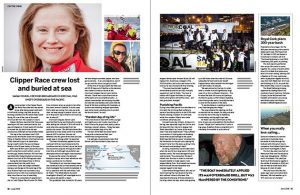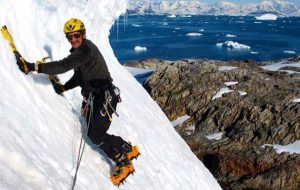Ocean racing carries risks and great sailors have been lost overboard. It takes just a moment when your guard is down – and often after the height of danger has apparently passed, says Skip
 Of course the loss of crewmember Sarah Young from the Clipper Round the World Race yacht IchorCoal in April was a tragedy. We should be under no illusions, though, that ocean racing does carry risks and it is the law of averages that loss of life will occasionally happen. This is not the first time and it won’t be the last.
Of course the loss of crewmember Sarah Young from the Clipper Round the World Race yacht IchorCoal in April was a tragedy. We should be under no illusions, though, that ocean racing does carry risks and it is the law of averages that loss of life will occasionally happen. This is not the first time and it won’t be the last.
No matter how much we dwell on safety issues we must all realise the ocean is not a golf course nor a tennis court. Unpredictable forces are continually at play. Remember the great Eric Tabarly? He was washed off the foredeck in the Irish Sea in 1998 and drowned. Given the man and his experience, this was at the time simply considered bad luck.
The people who elect to do what can be described as hardcore offshore sailing must certainly know the risks and they take those risks willingly. That should hopefully be the end of this story. It was a credit to the crew of IchorCoal that they decided to continue the race after a burial at sea. It was the only logical thing to do and, out of respect to a competitor, the race must go on.

An inquiry will no doubt follow. Why wasn’t she clipped on, apparently against the usual protocols?
I suspect it was simply a moment of letting the guard down. I am a big fan of harnesses. My philosophy has always been that a harness is more fundamental than a lifejacket. Staying on board is everything.
Whitbread photos
Having said that, in my early sailing career I can barely remember wearing them. When I look back through my Whitbread photos it is amazing how many there are of the crew sitting on the weather rail or doing manoeuvres in heavy weather wearing no harnesses or lifejackets. Rest assured, though, when it got to a certain point of severity no one had to be told it was time to put one on.
“I have come close to being washed overboard twice in my sailing career.
On both occasions it was not at the height of the storm when senses are finely tuned”
It is a good rule that at a certain wind speed or during the hours of darkness in all conditions harnesses are worn and clipped on at all times, but it is an overly optimistic expectation to achieve this 100 per cent of the time. Anyone who has spun the handles of a coffee grinder or for that matter any top handle winch while wearing a harness knows what it’s like to have the tether wound up in the handles, not to mention bruised knuckles from the harness buckles.
Getting in the way
Tether design is greatly improved to mitigate this, but there are times when they simply get in the way of a job in hand. Moving about the deck while always clipped on is another difficulty. Yes, it should be possible if the jacklines are well run, but being brought up short by the tether while trying to reach for something is an annoyance.

Photo: Tor Johnson
So we sometimes forego the attachment for speed and efficiency. Moving forward and aft or across the yacht with alacrity and in safety, all the while gauging the pitch and heave of the yacht while keeping an eye on the waves, is a skill like any other.
Learning my lesson
I have come very close to being washed overboard twice in my sailing career. I didn’t learn my lesson the first time, but the second time it stuck. On both occasions it was not at the height of the storm when our senses are finely tuned. The heavy weather had passed; the wind was right down, but the sea was still running.
I had my back to the ocean sitting on the high side of the cockpit, mind in neutral, relaxed and taking in the view. Without warning a wave gently came over the quarter and floated me right out of the cockpit and over the leeward lifelines. I snatched a hold and levered myself back on board.
What lesson can we draw from this? When you start thinking a harness is probably not necessary, you can be at your most vulnerable.
 Skip Novak is a columnist and regular contributor to Yachting World, and author of our acclaimed Storm Sailing Series, which you can also find on our website. He was born in Chicago in 1952 and started sailing at an early age. He has raced in four Whitbread Round the World races and in 2001 co-skippered the 108ft catamaran Innovation in The Race round the world in 65 days, an event in which his future wife, Elena, also raced. In 1987 he built the steel cutter Pelagic and has since spent 26 seasons in Tierra del Fuego, South Georgia and Antarctica, sailing and mountaineering.
Skip Novak is a columnist and regular contributor to Yachting World, and author of our acclaimed Storm Sailing Series, which you can also find on our website. He was born in Chicago in 1952 and started sailing at an early age. He has raced in four Whitbread Round the World races and in 2001 co-skippered the 108ft catamaran Innovation in The Race round the world in 65 days, an event in which his future wife, Elena, also raced. In 1987 he built the steel cutter Pelagic and has since spent 26 seasons in Tierra del Fuego, South Georgia and Antarctica, sailing and mountaineering.




